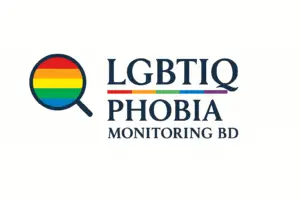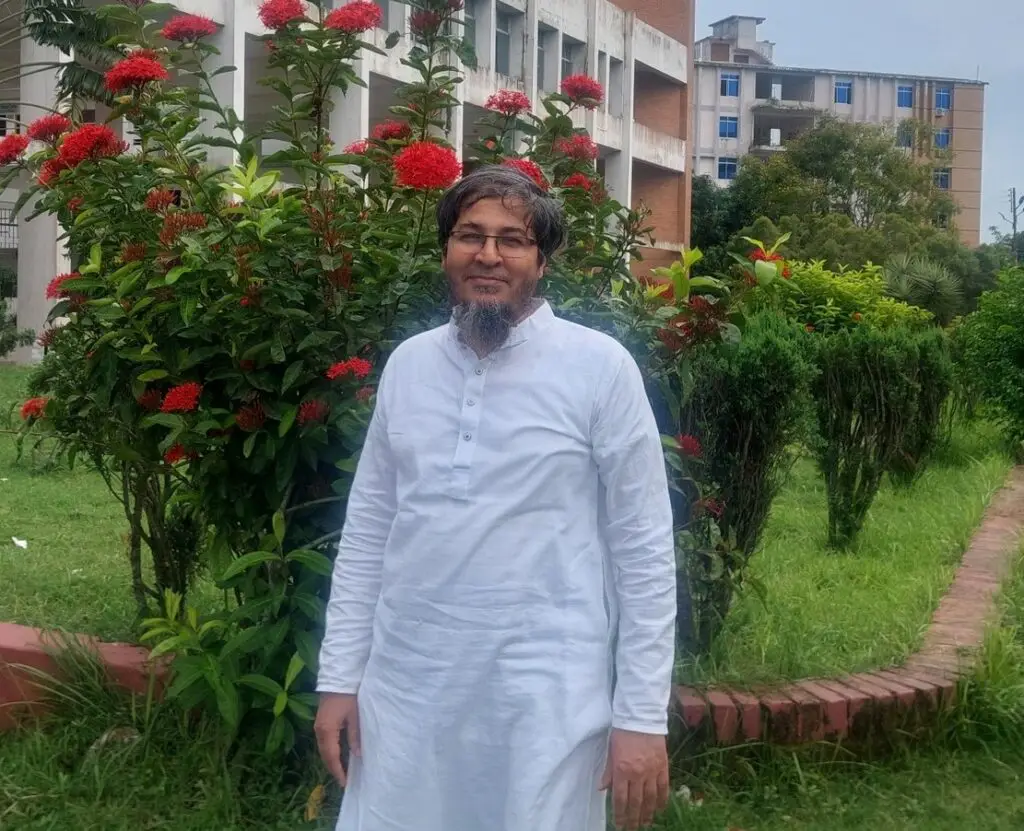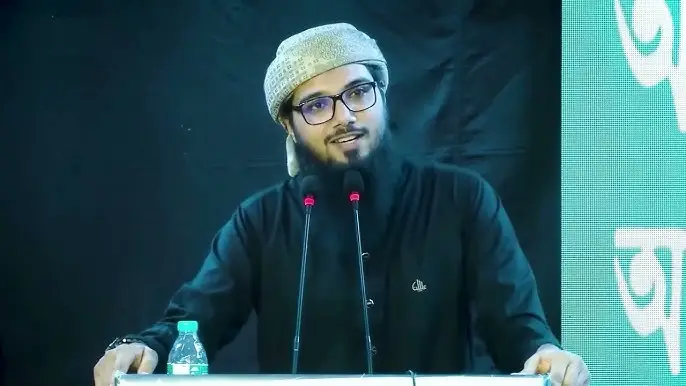Anti-LGBTIQ+ Leader: Asif Mahtab Utsha
Asif Mahtab Utsha (born January 1, 1985) is a Bangladeshi academic and public speaker known for his staunch anti-LGBTQ+ and anti-transgender stance. He grew up in Rangunia, Chittagong, and completed his O-levels in 2010 and A-levels in 2012. Utsha studied English at North South University (NSU) from 2013, earning his undergraduate degree in 2017. He then pursued higher studies abroad: enrolling in the University of Glasgow in 2019 for an MSc in Analytical Philosophy, which he completed in 2020. Upon return to Bangladesh, Utsha conducted research under Dhaka University on philosophical topics.
Professionally, Asif Mahtab Utsha’s career began in education and training. In 2018 he worked at the British American Resource Center, and in 2019 he joined Mastermind School in Dhaka as a senior teacher. He later became an Assistant Lecturer in Philosophy at Bangladesh Open University, before being appointed as a contract-based Lecturer in Philosophy at BRAC University. At BRAC University (a leading private university in Dhaka), he was a part-time faculty member in the Department of Philosophy until early 2024. Utsha also gained a following as a public speaker on social media, often voicing strong opinions on social and political issues. In 2012, he founded a cultural organization called “Onno Kotha” and participated in various social and cultural activities. Despite his academic background, Utsha has become most notorious for his outspoken opposition to LGBTQ+ inclusion and secular ideals in Bangladesh.
Anti-LGBTQ+ and Anti-Trans Activities
Asif Mahtab Utsha emerged as a prominent figure in anti-LGBTQ+ activism through a series of high-profile incidents and statements in 2023–2024. His activities have been characterized by public protests, inflammatory rhetoric, and misinformation targeting sexual and gender minorities.
Opposition to Trans-Inclusive Curriculum: In January 2024, Utsha ignited nationwide controversy by attacking a chapter in a 7th-grade textbook that discusses the Hijra (third gender) community. At a seminar on the new national curriculum held on Jan 19, 2024 – an event organized by a conservative teachers’ forum – Utsha claimed that “inserting a transgender story in the textbook is brainwashing students”. During his speech (delivered alongside prominent Islamist figures, including the leader of Islami Andolon Bangladesh), he dramatically tore pages out of the government-issued textbook that contained “The Story of Sharifa,” a short story about a transgender girl’s experiences. He live-streamed this act of vandalism on Facebook, urging others in the audience to also rip out the pages as a form of protest. Utsha argued that the inclusion of transgender topics in school books would “promote homosexuality” among children. He later doubled down on this stance in media interviews, calling the chapter “an attempt to brainwash our children” under the guise of diversity. Utsha insisted he supports “protecting [transgender] people’s rights” in principle, but he contended that “this story is not going to help them”. His actions at the seminar — literally destroying textbook pages — were widely condemned as an attack on education and inclusivity, and BRAC University viewed it as unacceptable “vandalism” of national property.
Spreading Misinformation and Hate Speech: Beyond the textbook incident, Asif Mahtab Utsha has regularly propagated false and derogatory claims about the LGBTQ+ community, especially on social media and online talk shows. He has alleged, for example, that a shadowy elite cabal is “forcing youth to be LGBTQ” in Bangladesh. In a podcast interview on the UK-based 5Pillars “Blood Brothers” show in late 2023, Utsha framed LGBTQ rights and secularism as part of a nefarious Western agenda undermining Bangladesh’s values. Utsha’s rhetoric often veers into extreme conspiracy theories and fear-mongering. He claimed that in Western countries “universities force individuals to be gay, and if you don’t comply, you are expelled… and cannot secure employment”, an entirely baseless assertion. He further warned that Bangladesh would enact laws giving transgender people job preferences and punishing dissenters: “Boys who identify as girls will get jobs, and those speaking against this will be fined and jailed for one year… If this law is passed, we are done for”. These statements exemplify Utsha’s brand of anti-LGBTQ+ hate speech—portraying sexual and gender diversity as a “Western” plague and inciting panic that traditional society is under attack. He also routinely invokes religion to justify his stances, accusing LGBTQ+ advocacy of being anti-Islamic and immoral. Utsha’s commentary blends homophobia and transphobia with broader anti-secular sentiment; he positions himself as a defender of Bangladeshi Islamic values against what he calls the “LGBTQ agenda” and secular democracy.
Harassment of LGBTQ+ Advocacy Groups: In early 2024, Utsha escalated his activism from words to direct action against organizations supporting LGBTQ+ rights. On February 20, 2024, he led a crowd of protesters to besiege the Dhaka office of Bandhu Social Welfare Society, an NGO that advocates for gender-diverse communities’ health and rights. This came after Utsha publicly accused Bandhu of helping introduce the transgender-inclusive chapter in the school curriculum and urged his followers to “protest the initiatives by Bandhu”. During the protest, which Utsha live-streamed on Facebook, demonstrators held banners and chanted slogans against Bandhu, effectively trapping the NGO’s staff inside their building in fear. Utsha made inflammatory remarks on camera, labeling Bandhu and similar NGOs as “enemies of the country” and implying they were propagating foreign (Western) ideas of gender equality. According to Bandhu officials, Utsha showed a fundamental ignorance about the difference between Bangladesh’s traditional Hijra community and transgender identities. He conflated the two and accused Bandhu of “promoting [a] Western culture” of gender change, which he claimed was harming the hijra community. Bandhu representatives refuted his assertions, clarifying that the textbook content was introduced by the National Curriculum board and not by Bandhu, and that their organization only conducts advocacy with government approval—not any “brainwashing” as Utsha alleged. The protest was eventually dispersed when police intervened, and Bandhu filed a General Diary (police complaint) over the intimidation and threats. This incident showed Utsha’s willingness to mobilize public harassment against LGBTQ+ rights defenders.
Impact on the LGBTQ+ Community
Asif Mahtab Utsha’s activities have had a chilling effect on Bangladesh’s LGBTQ+ and gender-diverse communities. His high-profile hate speech and campaigns contribute to an atmosphere of stigma, misinformation, and fear. By attacking inclusive educational material, Utsha attempted to roll back representation of transgender people in schools, a move activists say undermines understanding and tolerance among youths. Educators and social scientists noted that the chapter “Sharifa’s Story” was about basic gender awareness, not sexuality, and that Utsha’s outcry created widespread misunderstandings. Indeed, the backlash he fueled led to a government committee being formed to review or potentially remove the textbook chapter, bowing to pressure from conservatives. This is a setback for inclusion, as such educational content was meant to foster empathy towards hijra and transgender people.
More alarmingly, Utsha’s rhetoric has emboldened hardline elements to target LGBTQ+ individuals and allies more directly. His public smearing of Bandhu Social Welfare Society as traitorous influenced some followers to share Bandhu’s address and call for attacks on the NGO – a dangerous incitement that put lives at risk. Bandhu staff described the public comments directed at them as “offensive” and noted that ignorance and religious extremism were being weaponized against sexual minoritiesd. Such hostile attention can endanger an already vulnerable community. Bangladesh’s LGBTQ+ activists operate under threat; in one notorious instance, extremist militants brutally murdered Xulhaz Mannan and Mahbub Tonoy, two prominent LGBTQ rights advocates, in 2016, and no public Pride events have been allowed since. Utsha’s branding of LGBTQ+ advocacy as “interference with God’s creation” echoes the rhetoric of those extremists. By lending an academic’s voice to anti-LGBTQ+ vitriol, Utsha has helped legitimize prejudice in the eyes of some segments of society. His false claims (such as impending laws to jail critics of transgender rights) sow panic and could incite violence or discrimination against transgender people and those perceived as supporting them. Community members report that such hate speech increases their sense of isolation and fear of public harassment. In summary, Utsha’s actions have harmed efforts to create a safer, more inclusive environment for LGBTQ+ Bangladeshis, instead reinforcing the social marginalization of these groups.
Activist and Public Response
Utsha’s anti-LGBTQ+ crusade has drawn significant backlash from human rights organizations, progressive activists, and many in civil society who support secularism and diversity. Immediately after his textbook-tearing stunt, BRAC University students and faculty were split – a group of conservative students staged protests supporting Utsha and even demanded banning transgender students on campus. BRAC University itself clarified that Utsha’s contract was not renewed specifically because his act of destroying a government textbook in public was unethical and unprofessional, calling it “non-facilitating teacher behaviour” and “an act of vandalism” that the university cannot tolerate. The university reaffirmed its commitment to tolerance and equal opportunity for all students, and explicitly stated that it “does not promote homosexuality” as some critics alleged. In other words, BRAC University distanced itself from Utsha’s views while upholding inclusive values in line with the national constitution.
Local and international LGBTQ+ rights advocates applauded BRAC University’s stance and denounced Utsha’s actions. Within Bangladesh, prominent social commentators and writers also spoke out. Paris-based Bangladeshi author Jannatun Nayeem Prity wrote that “a person who cannot respect people of all genders as human beings has no qualification to be a teacher,” implicitly rebuking Utsha’s fitness as an academic. This sentiment was widely shared on social media, where many criticized Utsha’s lack of tolerance and professionalism.
Notably, members of the LGBTQ+ community themselves have raised their voices. Tanisha Yeasmin Chaity, a transgender rights activist in Bangladesh, labeled the anti-trans campaign spearheaded by people like Utsha as “inhumane.” She argued that these campaigners were portraying the transgender community as anti-Islamic to turn the public against them. “If a person is born with an illness, can it not be treated? So why would it be an offense to cure gender-related ailments?” Chaity said, referring to gender dysphoria as something that can be cared for, not punished. Her statement highlights that denying transgender people recognition or healthcare is cruel and irrational. Other human rights activists in Bangladesh have similarly warned that vilifying a minority group under religious pretexts erodes social cohesion. They stress that education and dialogue – not censorship or hate – are the way to address misunderstandings about gender diversity.
On the other hand, Utsha has been praised and defended by Islamist political groups, underscoring the polarized response to his case. The Islamist party Jamaat-e-Islami lauded Utsha as “a true idealistic teacher” for “strongly [criticizing] homosexuality” in line with what they claim are the sentiments of Bangladesh’s Muslim majority. Jamaat’s leaders condemned BRAC University for dismissing him and demanded his immediate reinstatement, painting the issue as one of protecting national identity and Islamic values. Similarly, the Islamist group Islami Andolon’s student wing and aligned organizations threatened to boycott all BRAC-affiliated institutions (including BRAC University, BRAC Bank, etc.) if Utsha was not rehired. These groups held rallies and issued statements accusing the government’s new curriculum of lacking morality and “ruining students’ character” – effectively using Utsha’s stance as a rallying cry against progressive education reforms. This pressure from conservative factions has put educational authorities in a tight spot, leading the Education Ministry to form a review committee on “Sharifa’s Story” and entertain the possibility of removing it from textbooks. A legal notice was even served by a Supreme Court lawyer seeking to ban the chapter, absurdly labeling transgender people “mentally disturbed” and the textbook content “perverted” and blasphemous.
Despite the support he enjoys from anti-LGBTQ+ quarters, Utsha faces ongoing criticism and resistance from the LGBTQ+ community and allies. Activists continue to document and publicize his hate speech as part of a broader effort to monitor LGBTIQ-phobic leaders in Bangladesh. By shining a light on individuals like Asif Mahtab Utsha, human rights defenders aim to hold them accountable and counteract their harmful narratives with facts, education, and messages of inclusion.
Sources
newsflash71.com Newsflash71 – “ব্র্যাক বিশ্ববিদ্যালয়ের শিক্ষক, কে এই আসিফ মাহাতাব উৎস?” (Bengali article profiling Asif Mahtab Utsha’s background and the textbook controversy) by Raihan Rajib, Newsflash71, Jan 24, 2024.
benarnews.org Benar News – “Inclusion of transgender rights chapter in Bangladesh school textbooks sparks debate” by Ahammad Foyez, BenarNews, Jan 22, 2024.
bdnews24.com Bdnews24 – “Sharifa’s Story: BRAC University clarifies reason for Asif’s sacking” (BRAC University’s official statement on Utsha) bdnews24.com, Jan 29, 2024.
newagebd.net New Age – “BRAC Univ teacher Asif terminated” (report on Utsha’s termination and conservative groups’ reactions), New Age, Jan 22, 2024.
dhakatribune.com Dhaka Tribune – “Jamaat praises dismissed BracU teacher Asif, criticizes govt education policy” (Jamaat-e-Islami statement lauding Utsha), Dhaka Tribune, Jan 24, 2024.
dhakatribune.com Dhaka Tribune – “Now activists are targeted over ‘Sharifa’s Story’” (details of Utsha’s protest at Bandhu Social Welfare Society and its fallout), Dhaka Tribune, Feb 22, 2024.
76crimes.com – “Bangladesh professor fired for spreading misinformation about trans people” by Colin Stewart, 76crimes (Erasing 76 Crimes blog), Jan 26, 2024.
benarnews.org Benar News – Statements from Jannatun N. Prity and Tanisha Y. Chaity quoted in BenarNews article (cited above) responding to Utsha’s campaign, Jan 2024.
- linkedin.com LinkedIn/YouTube – “Secularism, The LGBTQ Agenda & A New Bangladesh – Blood Brothers Podcast #147” featuring Asif Mahtab Utsha (indicates Utsha’s appearance on an anti-secular, anti-LGBTQ podcast by 5Pillars), 2023.


